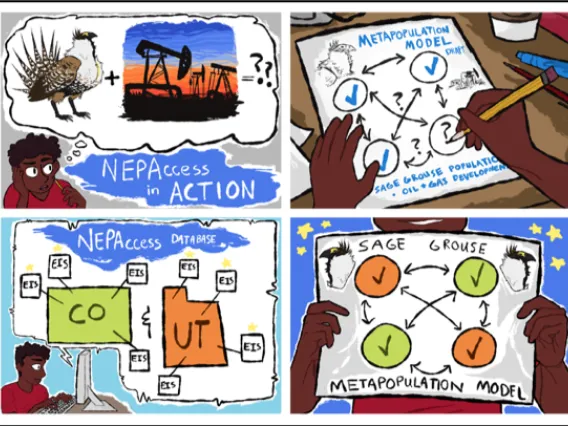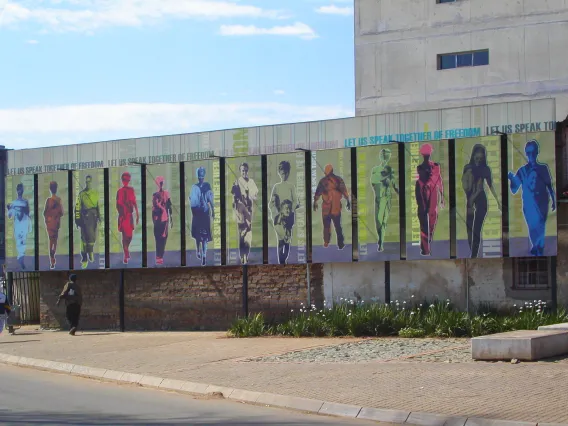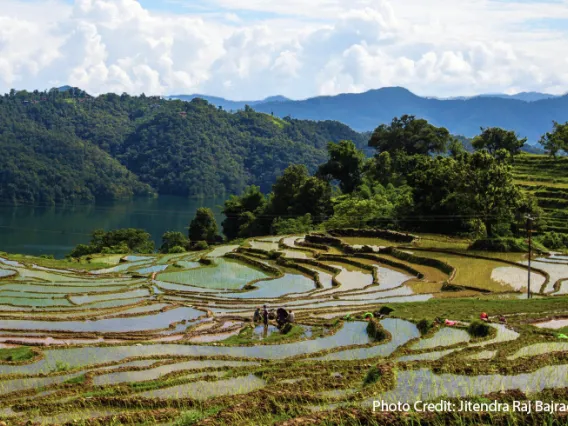The Udall Center’s mandate is to engage in applied research and outreach on public-policy topics relating to economic development, environment, tribal governance, public health, public lands, and energy transitions. Our work extends to such themes as social justice, gender equity, human well-being and quality of life, Indigenous entrepreneurship, and energy and renewables, as well as applied public policy, writ large. Our real-world public-policy orientation also is evident in our sustained institutional efforts on national immigration policy and our globally-recognized study of international and interjurisdictional borders, most particularly, the US-Mexico border. Sustaining international collaboration and policy engagement remains a hallmark of our applied public-policy programs. Additionally, over the past few years, we have pivoted strongly to include public-health policy with research outputs addressing food systems, water access, and tribal public-health laws.
Since 1995 we have worked in close partnership with the Udall Foundation, a federal agency, via a congressionally-defined relationship that includes provisions for a permanent annual funding mechanism that has provided major financial support. The Foundation has been instrumental in supporting our programs and is the co-creator, with the University, of our Native Nations Institute. The Udall Center enjoys both strong financial and robust programmatic relationships with the Foundation.
The results of our work have been broadly disseminated via a strong record of peer-reviewed publications, a host of influential white papers, frequent well-attended public forums, and exposure in media. The breadth of our public-policy engagements, accompanied by the exceptional success we have achieved in securing external funding for our applied policy work, has permitted us the flexibility necessary to move into new, mission-relevant policy areas as local, regional, national, and international needs dictate.
Discover the various themes we explore through our research:

Environmental Collaboration and Conflict Resolution
From the start of our relationship with the Udall Foundation, our environmental policy programs have emphasized cooperation and the potential for conflict. An important 1997 national conference organized by the Udall Center led to the 1998 creation of the McCain National Center for Environmental Conflict Resolution in Tucson. While that center has worked directly to help resolve conflicts involving federal agencies, our own efforts have been research-oriented.
Through a suite of externally-funded projects in the Southwest, the US-Mexico border region, and across the globe, we have studied the dynamics of stakeholder interactions associated with environmental issues, especially those relating to scarce water resources. Examining conflict through the lens of inclusivity, engagement, and collaborative governance and the role of technology, our ECCR work has most often addressed transboundary resource problems, groundwater governance, and water security.

Data Science and Governance
This research uses advanced data-science techniques such as natural language processing and stance analysis to enhance governance, policy, and access to decision-making, especially related to US environmental governance. The power of data science is key to improving the efficiency and accessibility of decision-making, understanding the role of public participation, and creating tools to assess environmental justice and other outcomes.
Currently, the NEPAccess project aims to revitalize the National Environmental Policy Act (NEPA) via an innovative knowledge and engagement platform for NEPA documents, data, and processes—laying the groundwork for NEPA to more fully realize its democratic ambitions and improve the efficiency and reliability of environmental governance.

Environmental Governance and Justice
We build on interdisciplinary efforts to find and implement best practices for a sustainable and equitable future. We specialize in studying environmental governance and justice, especially in the context of sustainable built environments and water. We focus on engaging local communities—especially women, Indigenous populations, and other underrepresented minority communities to create equitable and connected spaces.
Our research questions and outreach efforts are centered around decisionmaking processes, the outcomes derived from these processes, and the organizations and institutions involved. We conduct applied transdisciplinary research engaging the end-user from the proposal stage to ensure the outcomes are tailored to their needs and follow an iterative and adaptive process for listening and learning.

Indigenous Governance: The Native Nations Institute
Via our Native Nations Institute, an internationally renowned research and service entity focused on Indigenous nation-building, we engage in political and community capacity-building, leadership development, economic development, entrepreneurship, data sovereignty, youth programs, criminal justice, public health, child welfare, and intergovernmental relationships in the context of colonization.
We seek to serve Indigenous nations in actualizing their full sovereignty, train emerging Native leaders and staff across the University and the broader nonprofit sector through our “Native Know-How” workshop, and manage a database of several thousand digital materials in support of tribal self-determination.

Heat Policy & Governance
As the climate continues to respond to changing conditions, the effects of extreme heat are more severe than ever. We intentionally connect with transdisciplinary researchers and networks of community practitioners and stakeholders to address systemic inequalities around heat mitigation strategies, resilience efforts, and access to ecosystem services.
By creating formal affiliations with researchers across campus in addition to community practitioners and local municipalities, we are able to harness diverse research data in conjunction with practical knowledge and traditional understanding to build the resilience of communities particularly affected.

Science Diplomacy and Hydrodiplomacy
In examining how nation-states and neighboring jurisdictions cope with transboundary freshwater resources, we bridge disciplines and borders to help create a sustainable and less conflictive global future. Since our establishment, we have convened influential science-policy dialogues to help bridge differing perspectives among government agencies, scientists, NGOs, community groups, the private sector, and other stakeholders.
Our approach relies on researching hotspots, present conditions, current policies, and perceived modes of cooperation in various areas of instability, to help understand barriers to effective governance. An area of special interest has been our study of hydrodiplomacy and pathways for cooperation, a critical topic at a time of increased water scarcity across the world.

Water Security and Policy
For many years, we have engaged in multiple long-term projects on the subject of water security. With growing pressure from climate change, urbanization, population growth, and other drivers, equitable access to sufficient quantities of good quality water for humans and the environment now and in the future (i.e., water security) is threatened. Through our work, we guide water-security planning in our own region and elsewhere.
Our research, which highlights demand management strategies, has addressed governance-based approaches to water scarcity and inequity, water-quality degradation, conservation, and development of alternative supplies such as reuse. As with hydrodiplomacy, we facilitate science-policy dialogues across international political boundaries to help devise equitable and effective policies that enable global water security.

Natural Resources Policy and Management
Our spatial subsidies and ecoclimate teleconnections projects recognize that environmental change in one location may affect human well-being in distant locations. Ecosystem services from migratory species can be understood as spatial subsidies when benefits are provided in specific locations, but the species depend on habitat elsewhere as well.
Our ecoclimate teleconnections work aims to understand the effects of loss of forest cover in one place on temperature, precipitation, and agricultural yields in distant locations. We use our research to inform transboundary natural resource and public lands policy.

Energy Policy and Renewables
We apply research to address renewable energy transitions. We address critical policy challenges associated with transitions to renewable energy, decarbonization, and socio-ecological impacts of energy futures with applicable research in transboundary river basins, urban-rural communities, and the water-energy-food nexus, which encompasses the effects of and impacts on water use, energy production, and land use.
Our efforts explore the institutional and policy contexts surrounding the transition to and implementation of renewable energy, including barriers and opportunities for innovation and just transitions. As with all our work, we approach this research through a lens of equity to address ineffectual or unjust policies, especially for underrepresented communities.

Food Systems and Health
We partner with schools, neighborhood and Indigenous associations, and local and tribal governments on both sides of the US-Mexico border to establish community gardens and promote small-scale entrepreneurship for marketing products produced by women and Indigenous workers. By encouraging better diets relying on locally-grown food and traditional modes of production, we are promoting public health among populations with high morbidity rates.
Researchers at our Native Nations Institute also study Indigenous food systems and are partners of the Indigenous Food Knowledges Network, which gathers Indigenous leaders, community practitioners, and scholars (both Indigenous and non-Indigenous) to research and build community capacities related to food sovereignty and Indigenous Knowledge.

